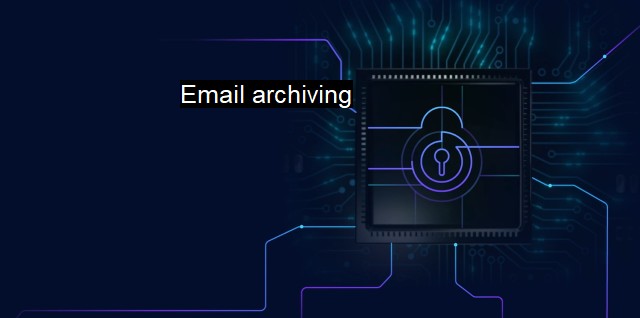What is Email archiving?
The Importance of Email Archiving: A Critical Piece of the Cybersecurity Puzzle
Email archiving is a systematic approach to saving and protecting the data contained in email messages to enable fast retrieval. As a critical component of business and operational workflows, email systems are prime targets for cybersecurity threats. The methodology and set tools focused on storing emails in a secure place can prove to be an effective mechanism while addressing potential security threats and ensuring the continued flow of communication. Today, as the digital communication landscape gradually becomes more complicated due to faster communication modes, email archiving plays a vital role in cybersecurity and antivirus management.To get a clearer understanding of email archiving, consider it as a vault where every single email that comes in or goes out of your firm is stored for an extended period. Beyond typical storage, email archiving also involves indexing as a part of its process. This helps in the quick retrieval of necessary details if required. From a cybersecurity perspective, the archiving system ensures all correspondence, comprising possibly insecure connections, gets accumulated in a secure database, which further can be examined and checked efficiently.
Email archiving manages two central issues related to email security. Firstly, it secures against data loss, which can happen due to system crises, user errors, or targeted cyber-attacks. Secondly, it forms a barrier against cybersecurity intimidations, like phishing or ransomware attacks. In several instances, an effective email archiving system accompanied by robust antivirus protection mostly deters cybercriminals as infiltrating such systems is complex and time-intensive.
Understanding the significance of emails as a common mode of communication within several organizations, cybercriminals are consistently innovating their malicious operations. They engineer sophisticated and tailored cyberattacks to manipulate standard email communication protocols by spreading deadly viruses, spyware, and other forms of malware. In such situations, having access to all past emails aids not only in tracking anomalous patterns in the sent and received emails but also aids organizations in early detection of potential security threats.
Nowadays, security professionals continually update antivirus software to safeguard email systems from emerging threats like Zero-day threats. In such situations, an email archiving system integrated with an antivirus can provide an extra-layer of protection that scans and blocks any harmful attachments or embedded links. This exemplifies a proactive approach towards cybersecurity wherein suspicious files are quarantined, and phishing emails are filtered to ensure the enterprise’s safety.
In addition to cybersecurity benefits, email archiving can also assist with regulatory compliance. Various laws mandate organizations to retain business-related emails and demonstrate that email systems are secure against data breaches. For instance, GDPR requires organizations to protect personal data, while PCI DSS requires businesses that handle credit card data to safeguard this information. When implemented effectively, email archive systems can help adhere to these rules, providing an audit trail of all correspondence.
Harsh though the reality may be, with increased reliance on technology and digital mediums for communication, cybersecurity threats are inevitably looming large. Email archiving stands out as an effective tool helping counter these threats while also fulfilling regulatory and operational needs. Regardless of the business scale, integrating email archiving with a firm's cybersecurity and antivirus protocols is no longer a luxury but, rather, a crucial lever in ensuring the overall integrity of the business. That is why considering email archiving should be a significant part of any business's cybersecurity strategy, ultimately aiming to protect both business and customer information from potential cyber threats.

Email archiving FAQs
What is email archiving and why is it important for cybersecurity?
Email archiving is the process of preserving and storing email messages in a secure and organized manner. It is important for cybersecurity because it allows organizations to retrieve and review email messages in case of a security breach, compliance audit, or legal dispute.What are the benefits of email archiving for antivirus protection?
Email archiving can help antivirus protection by allowing organizations to scan archived emails for malware and viruses. It also provides a backup of all email messages, which can be restored in case of a virus or malware attack.What are some best practices for email archiving in cybersecurity?
Some best practices for email archiving in cybersecurity include setting up an email retention policy, implementing strong access controls, encrypting archived emails, regularly backing up archives, and monitoring archives for suspicious activity.What are the legal requirements for email archiving in cybersecurity?
The legal requirements for email archiving depend on the jurisdiction and industry. However, some common requirements include retaining emails for a certain period of time, protecting the privacy of archived emails, and providing access to archived emails when required by law. It is important to consult with legal counsel to ensure compliance with relevant laws and regulations.| | A | | | B | | | C | | | D | | | E | | | F | | | G | | | H | | | I | | | J | | | K | | | L | | | M | |
| | N | | | O | | | P | | | Q | | | R | | | S | | | T | | | U | | | V | | | W | | | X | | | Y | | | Z | |
| | 1 | | | 2 | | | 3 | | | 4 | | | 7 | | | 8 | | |||||||